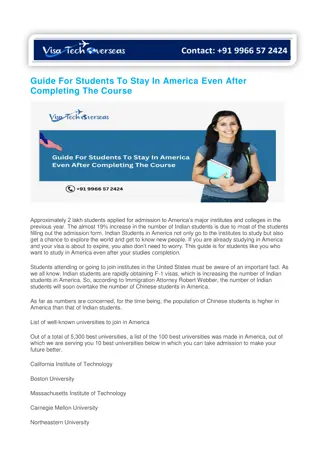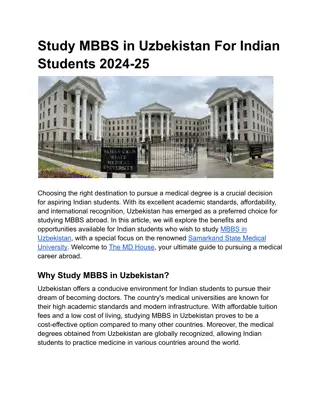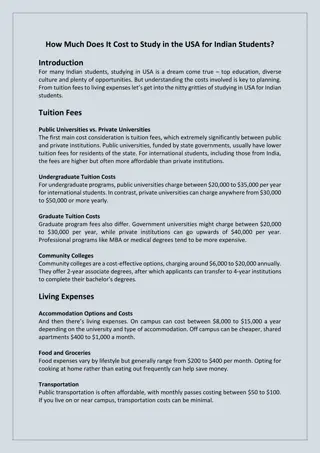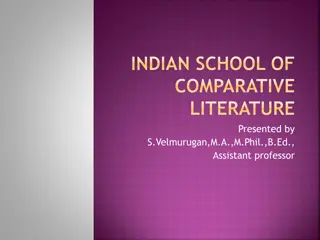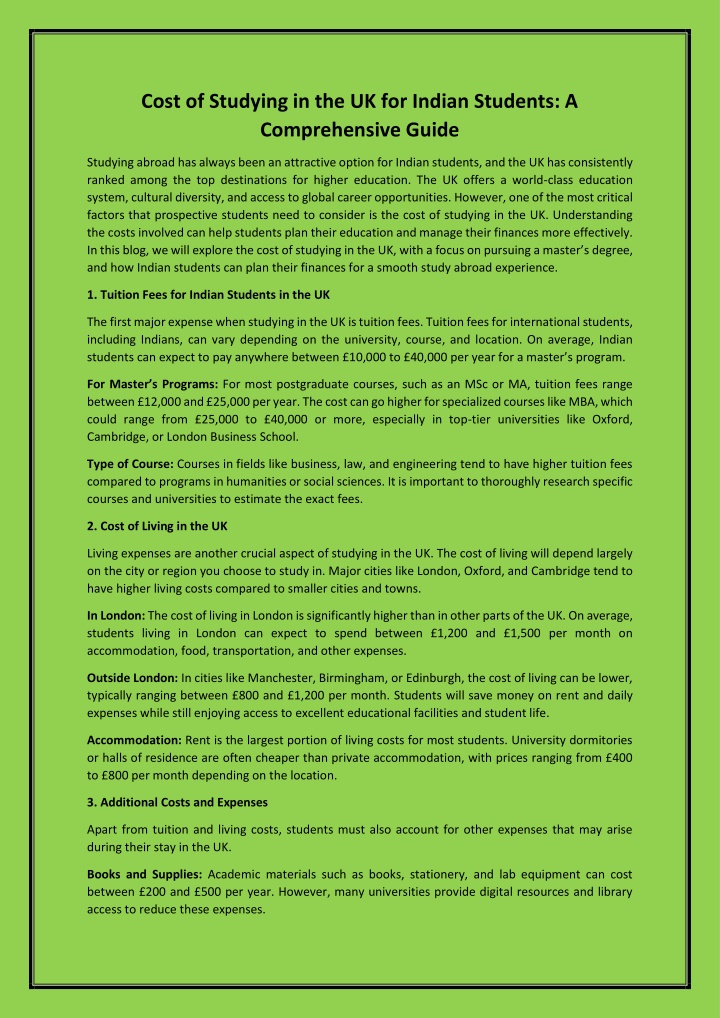
Cost of Studying in the UK for Indian Students
Studying in the UK is an exciting and enriching experience, but it comes with a significant cost. Indian students should be well-prepared for tuition fees, accommodation, and living expenses. Careful planning, budgeting, and exploring scholarship opp
Download Presentation

Please find below an Image/Link to download the presentation.
The content on the website is provided AS IS for your information and personal use only. It may not be sold, licensed, or shared on other websites without obtaining consent from the author. If you encounter any issues during the download, it is possible that the publisher has removed the file from their server.
You are allowed to download the files provided on this website for personal or commercial use, subject to the condition that they are used lawfully. All files are the property of their respective owners.
The content on the website is provided AS IS for your information and personal use only. It may not be sold, licensed, or shared on other websites without obtaining consent from the author.
E N D
Presentation Transcript
Cost of Studying in the UK for Indian Students: A Comprehensive Guide Studying abroad has always been an attractive option for Indian students, and the UK has consistently ranked among the top destinations for higher education. The UK offers a world-class education system, cultural diversity, and access to global career opportunities. However, one of the most critical factors that prospective students need to consider is the cost of studying in the UK. Understanding the costs involved can help students plan their education and manage their finances more effectively. In this blog, we will explore the cost of studying in the UK, with a focus on pursuing a master s degree, and how Indian students can plan their finances for a smooth study abroad experience. 1. Tuition Fees for Indian Students in the UK The first major expense when studying in the UK is tuition fees. Tuition fees for international students, including Indians, can vary depending on the university, course, and location. On average, Indian students can expect to pay anywhere between 10,000 to 40,000 per year for a master s program. For Master s Programs: For most postgraduate courses, such as an MSc or MA, tuition fees range between 12,000 and 25,000 per year. The cost can go higher for specialized courses like MBA, which could range from 25,000 to 40,000 or more, especially in top-tier universities like Oxford, Cambridge, or London Business School. Type of Course: Courses in fields like business, law, and engineering tend to have higher tuition fees compared to programs in humanities or social sciences. It is important to thoroughly research specific courses and universities to estimate the exact fees. 2. Cost of Living in the UK Living expenses are another crucial aspect of studying in the UK. The cost of living will depend largely on the city or region you choose to study in. Major cities like London, Oxford, and Cambridge tend to have higher living costs compared to smaller cities and towns. In London: The cost of living in London is significantly higher than in other parts of the UK. On average, students living in London can expect to spend between 1,200 and 1,500 per month on accommodation, food, transportation, and other expenses. Outside London: In cities like Manchester, Birmingham, or Edinburgh, the cost of living can be lower, typically ranging between 800 and 1,200 per month. Students will save money on rent and daily expenses while still enjoying access to excellent educational facilities and student life. Accommodation: Rent is the largest portion of living costs for most students. University dormitories or halls of residence are often cheaper than private accommodation, with prices ranging from 400 to 800 per month depending on the location. 3. Additional Costs and Expenses Apart from tuition and living costs, students must also account for other expenses that may arise during their stay in the UK. Books and Supplies: Academic materials such as books, stationery, and lab equipment can cost between 200 and 500 per year. However, many universities provide digital resources and library access to reduce these expenses.
Health Insurance: As an international student, its mandatory to pay the healthcare surcharge as part of the visa application process. This costs around 470 per year, giving you access to the UK's National Health Service (NHS). Travel Costs: Students will also need to factor in travel expenses for flights back home during holidays and occasional trips within the UK or Europe. Booking flights in advance and opting for student discounts on transportation can help save money. 4. Financial Aid and Scholarships for Indian Students To ease the financial burden of studying in the UK, Indian students can explore various scholarships and funding options. Many UK universities offer scholarships to international students, including merit-based and need-based awards. Some of the prominent scholarships for Indian students include: Chevening Scholarship: A prestigious UK government scholarship that offers full financial support for master s courses. Commonwealth Scholarship: This scholarship is for students from Commonwealth countries, including India, who wish to pursue a master s or PhD in the UK. University-Specific Scholarships: Many UK universities offer partial or full scholarships for international students, based on academic performance or financial need. It is advisable to check with the respective universities for available scholarships. Additionally, Indian students can apply for education loans from various Indian banks or financial institutions to cover tuition and living costs. 5. Post-Graduation Work Opportunities in the UK One of the most attractive features of studying in the UK is the post-study work options available for international students. The UK government introduced the Graduate Route, allowing students who complete an eligible course to stay in the UK for two years to look for work. This provides an opportunity to gain international work experience and potentially work in the UK after graduation, which can contribute to offsetting the cost of education. More Blogs: Study Abroad in Ireland Study in Australia for Indian Students Study Abroad Consultants in Delhi





